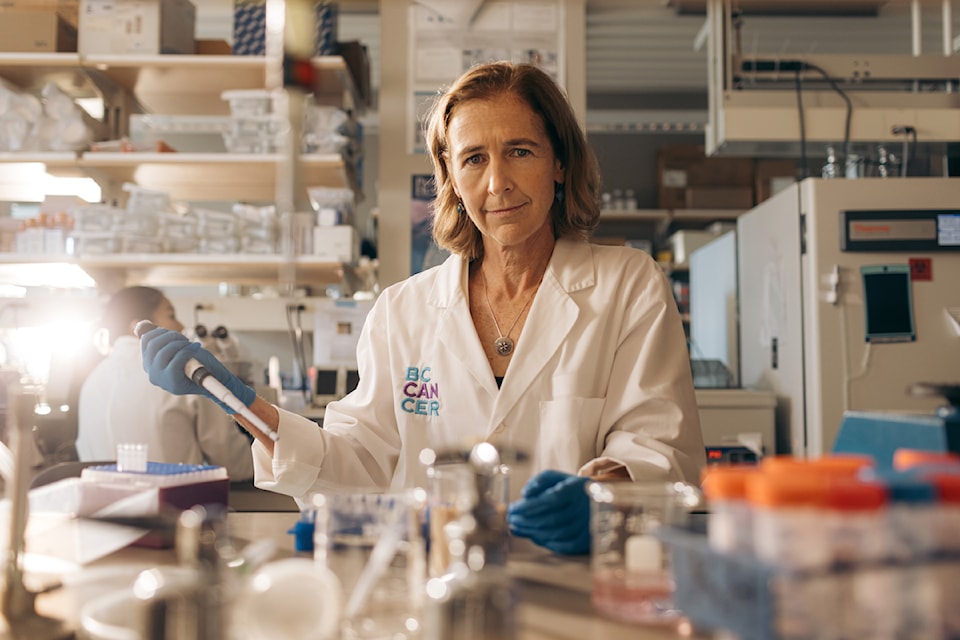Science
AI Innovations Set to Revolutionize Women’s Cancer Care in Victoria

Researchers in British Columbia are poised to enhance women’s cancer care through innovative artificial intelligence (AI) technology. Dr. Jessica McAlpine and Dr. Ali Bashashati from BC Cancer and the University of British Columbia (UBC) are developing AI tools that aim to transform the diagnosis and treatment of endometrial cancer, the sixth most common cancer among women.
Endometrial cancer presents unique challenges for medical professionals. Its cellular structure often appears ambiguous under examination, leading to inconsistent and subjective diagnoses. This uncertainty complicates treatment decisions, making it difficult for doctors to determine which patients require treatment and the most appropriate type of intervention. In response, the researchers have created a system that categorizes this type of cancer into four distinct groups, each associated with varying clinical outcomes.
Despite this progress, one group remained highly diverse, necessitating further investigation. The introduction of the AI ProMisE test has proven instrumental in enhancing diagnostic accuracy. “We were able to look at these images of tumours and identify things that the pathologist couldn’t see and that the molecular tools couldn’t identify,” noted Dr. McAlpine. This technology allows clinicians to identify patients who may appear to have favorable prognoses but are at risk for worse outcomes. Consequently, doctors can direct these patients toward more intensive treatment options, potentially preventing cancer recurrence.
The AI tools, which include advanced scanning equipment, are expected to be implemented in centres such as Victoria as early as 2024, subject to securing philanthropic funding and regulatory approvals. “We plan to pilot it in a couple of centres, and Victoria is potentially one of those,” Dr. McAlpine explained. “I think Victoria will be key, and they have a fantastic team of researchers and oncologists that we work with.”
The potential deployment of these tools in Victoria holds personal significance for Dr. Brad Nelson, who recently assumed the Immunotherapy Research Chair at BC Cancer in the city. Dr. Nelson has expressed concerns about the historical lack of research in women’s cancers, an issue that resonates deeply with him. The Trev & Joyce Deeley Research Centre in Victoria, named in honor of a significant donor whose wife died of ovarian cancer, underscores the area’s commitment to advancing cancer research.
William Litchfield, associate vice president of BC Cancer Foundation (Vancouver Island), emphasized the importance of this research. “Gynecological cancers are some of the most difficult cancers to treat and historically are an understudied area of cancer research. The innovative research underway at BC Cancer is incredibly important and holds the potential to save lives on the Island and across B.C.”
The announcement coincides with Gynecological Cancer Awareness Month in September, highlighting the urgent need for advancements in this field. AI technology is particularly effective in identifying high-risk endometrial cancers that traditional methods often overlook. Dr. McAlpine remarked, “There are so many other applications we’re also looking at. [AI tools] offer a more personalized or precision approach. You’re not treating everybody the same.”
As the potential for AI-enhanced diagnostics and treatments unfolds, the hope is that these innovations will significantly improve patient outcomes and reduce unnecessary procedures, thereby transforming the landscape of women’s cancer care in Victoria and beyond.
-

 Education3 months ago
Education3 months agoBrandon University’s Failed $5 Million Project Sparks Oversight Review
-

 Science4 months ago
Science4 months agoMicrosoft Confirms U.S. Law Overrules Canadian Data Sovereignty
-

 Lifestyle3 months ago
Lifestyle3 months agoWinnipeg Celebrates Culinary Creativity During Le Burger Week 2025
-

 Health4 months ago
Health4 months agoMontreal’s Groupe Marcelle Leads Canadian Cosmetic Industry Growth
-

 Science4 months ago
Science4 months agoTech Innovator Amandipp Singh Transforms Hiring for Disabled
-

 Technology4 months ago
Technology4 months agoDragon Ball: Sparking! Zero Launching on Switch and Switch 2 This November
-

 Education4 months ago
Education4 months agoRed River College Launches New Programs to Address Industry Needs
-

 Technology4 months ago
Technology4 months agoGoogle Pixel 10 Pro Fold Specs Unveiled Ahead of Launch
-

 Business3 months ago
Business3 months agoRocket Lab Reports Strong Q2 2025 Revenue Growth and Future Plans
-

 Technology2 months ago
Technology2 months agoDiscord Faces Serious Security Breach Affecting Millions
-

 Education4 months ago
Education4 months agoAlberta Teachers’ Strike: Potential Impacts on Students and Families
-

 Education3 months ago
Education3 months agoNew SĆIȺNEW̱ SṮEȽIṮḴEȽ Elementary Opens in Langford for 2025/2026 Year
-

 Science4 months ago
Science4 months agoChina’s Wukong Spacesuit Sets New Standard for AI in Space
-

 Business4 months ago
Business4 months agoBNA Brewing to Open New Bowling Alley in Downtown Penticton
-

 Business4 months ago
Business4 months agoNew Estimates Reveal ChatGPT-5 Energy Use Could Soar
-

 Technology4 months ago
Technology4 months agoWorld of Warcraft Players Buzz Over 19-Quest Bee Challenge
-

 Business4 months ago
Business4 months agoDawson City Residents Rally Around Buy Canadian Movement
-

 Technology4 months ago
Technology4 months agoFuture Entertainment Launches DDoD with Gameplay Trailer Showcase
-

 Technology2 months ago
Technology2 months agoHuawei MatePad 12X Redefines Tablet Experience for Professionals
-

 Top Stories3 months ago
Top Stories3 months agoBlue Jays Shift José Berríos to Bullpen Ahead of Playoffs
-

 Technology4 months ago
Technology4 months agoGlobal Launch of Ragnarok M: Classic Set for September 3, 2025
-

 Technology4 months ago
Technology4 months agoInnovative 140W GaN Travel Adapter Combines Power and Convenience
-

 Science4 months ago
Science4 months agoXi Labs Innovates with New AI Operating System Set for 2025 Launch
-

 Technology4 months ago
Technology4 months agoNew IDR01 Smart Ring Offers Advanced Sports Tracking for $169










